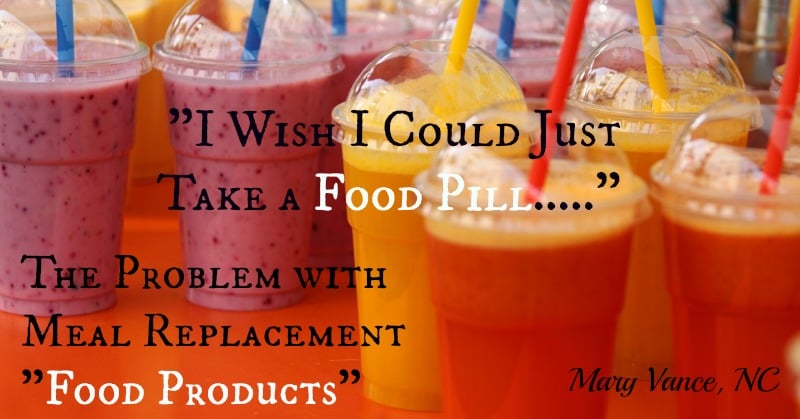“…. no cooking, no dishes, and perfect nutrition.”
A reader left this comment on one of my facebook posts the other day, and it reminded me of the many frustrated clients I work with who say they get so frustrated with trying to figure out what to eat that they wish they could just take a magic food pill and be done with it. That method exists in the form of a shake called Soylent, made of maltodextrin, rice protein, oat flour, a vitamin and mineral blend, and an oil blend made of fish oil and canola.
This “food product,” as it’s called, “was developed from a need for a simpler food source.” Creator Robert Rhinehart and team developed Soylent “after recognizing the disproportionate amount of time and money they spent creating nutritionally complete meals.” (from the website).
A dream come true for those who eat to live rather than live to eat. I want to discuss why I think both of these philosophies do us, as humans, a disservice.
First of all, food is meant to nourish us, NOT nurture us. Because food is so tied to emotional wellbeing, many of us nurture, comfort, and reward ourselves consistently with food, which can become problematic. After all, our first food was mother’s milk, the ultimate nurture and comfort. But food should not have that role in our adult lives: it’s meant to nourish us.
“Eat to live,” on the other hand, are the folks who take little or no joy or pleasure from eating, see it as a chore, an inconvenience. They’d rather take the food pill and get on with their lives. This isn’t ideal, either. Food and nourishing one’s self is and should be an enjoyable and pleasurable experience. Food is a social experience that helps foster community and family, a necessary component to happiness.
So what I’m saying is that while food should not be a crutch to fulfill emotional void or soothe anxiety, it is part of living a happy, vibrant life. Food replacement does not equal vitality.
Users of Soylent report more energy, clear skin, and even weight loss. Probably because it’s essentially allergen-free (no dairy or gluten), and these users are basically detoxing from a former diet high in processed or refined foods, or a diet that included foods to which they have hidden allergies/intolerance. And yes, soylent contains protein, fat, carbs, and vitamin/mineral complex, so it will keep you alive. But it’s not a real food. It lacks the enzymes, probiotics, oxygenating chlorophyll, and lifeforce that real food provides us. It’s also missing key nutrients, amino acids, and antioxidants that we get from including a variety of foods in our diet, both raw and cooked. Synthetic and enriched forms of vitamins & minerals are not as well absorbed by the body as real food.
A food pill/meal replacement shake may help a person with a poor diet feel better initially, but what are the long term effects? What deficiencies could develop? And after all, will a person on a food replacement product experience vibrant health from a variety of foods?
I am obviously against relying on meal replacement as a long term option for nutrition. I can say it would be an improvement over eating McDonald’s at every meal. If you hate to cook and are eating packaged and processed foods because of it, I’d urge you to find a way to reconnect with nourishing yourself. Start with just one meal a week–breakfast–or make a crock pot dinner, for example, but put some thought into a nourishing meal made with organic protein and vegetables. Here and here are some ideas about how to prepare food if you’re busy.
I believe that part of what makes optimal and vibrant wellness is self care: taking time to nourish yourself, get enough rest, handle your stress, and cultivate healthy relationships. You are what you eat, after all. Do you want your cells to be made up of synthetic food product? We don’t know the long term effects of those who rely solely on meal replacement. Could it compromise your capacity to fight disease in any way?
What do you think?
Please share and +1!

Mary Vance is a Certified Nutrition Consultant and author specializing in digestive health. She combines a science-based approach with natural therapies to rebalance the body. In addition to her 1:1 coaching, she offers courses to help you heal your gut and improve your health. Mary lives in San Francisco and Lake Tahoe in Northern California. Read more about her coaching practice here and her background here.





